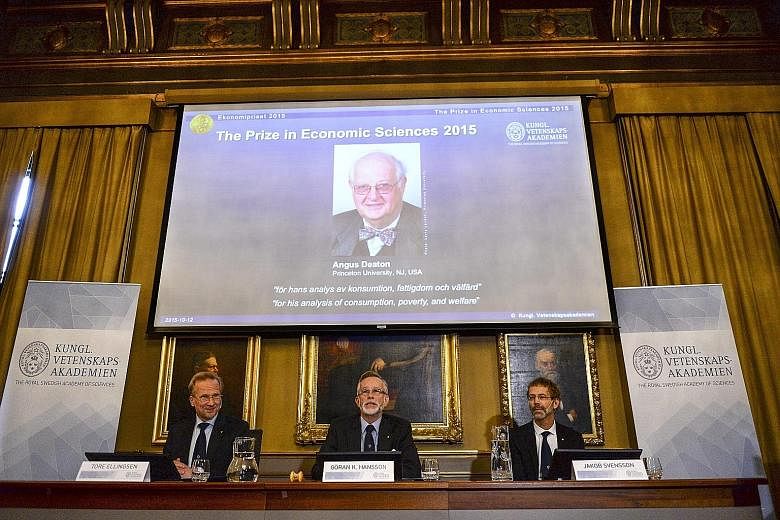STOCKHOLM • British-born economist Angus Deaton has won the Nobel Prize in economics for his work on consumption, poverty and welfare, the last laureate that will be unveiled this year.
"By emphasising the links between individual consumption decisions and outcomes for the whole economy, his work has helped transform modern microeconomics, macroeconomics and development economics," the Royal Swedish Academy of Sciences said yesterday.
"To design economic policy that promotes welfare and reduces poverty, we must first understand individual consumption choices. More than anyone else, Angus Deaton has enhanced this understanding," it added.
Professor Deaton was honoured for three related achievements: For developing with colleague John Muellbauer around 1980 a system for estimating the demand for different goods; studies of the link between consumption and income that he conducted around 1990; and the work he carried out in later decades on measuring living standards and poverty in developing countries with the help of household surveys.
His research has shown how the clever use of household data can shed light on issues such as the relationship between income and calorie intake, and the extent of gender discrimination with the family.
"Deaton's focus on household surveys has helped transform development economics from a theoretical field based on aggregate data to an empirical field based on detailed individual data," the academy said.
Speaking to reporters at the Nobel press conference by video link later, Prof Deaton said he believes that poverty will continue to decline.
"I do foresee a decrease. I think we have had a remarkable decrease for the past 20 to 30 years. I do expect that to continue," he said. But he noted that there are still 700 million extremely poor people, according to the World Bank, so "we are not out of the woods yet".
Prof Deaton, 69, was born in Edinburgh and has been a professor of economics and international affairs at Princeton University in the United States since 1983.
A citizen of the United States and Britain, Prof Deaton obtained his doctorate from the University of Cambridge.
His 2013 book, The Great Escape, maps the origins of inequality and its fallout spanning 250 years of economic history.
The Nobel honour comes with a prize sum of eight million Swedish kronor (S$1.4 million).
Last year, French economist Jean Tirole won the prize for his analysis of big companies, market power and regulation.
The economics prize caps this year's Nobel season.
AGENCE FRANCE-PRESSE, BLOOMBERG

